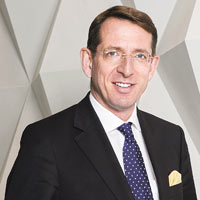Two years ago, writing for Khaleej Times, a leading daily in the United Arab Emirates, I was mildly pessimistic yet held out hope for the future in 2012. I was too early! The real fallouts of the big financial crisis had yet to take place — and indeed are still ongoing with the big banks being fined heavily for their misconduct. And the insurrections we called the “Arab Spring” were underway, but as yet seem not to have settled.
So why am I more confident? First, the uprisings: It is true that at present we see issues being fought over from West to Central Africa, round the North African coast and into the Middle East with Syria having, sadly, the largest death toll. Yet even in the latter country there is some easement of the situation — not so much on the ground where killings take place hourly, but at the negotiating tables in many countries.
There is a hint the solution might be as in Lebanon when Hussein Al Husseini brokered a solution in 1989: A plan was laid down by all sides (those internally involved, those supplying proxy aid and the major observers) to stop fighting and to talk. We all hope for Syria! We hope too in the wider Arab world that their deep divisions may be addressed by discussion rather than the tit-for-tat that has continued over centuries.
Can’t people see that such actions do not create solutions? The various “springs” need to acknowledge what Nature intended — it is the time for new growth. Second, the finances: The globe is slowly recovering its economic stability. This will indeed take a long time, as we were once too optimistic: We did not acknowledge the long time-span of the supply chains and their linkages into the money supply.
Crudely summarising — the banks failed, money lending slowed, and firms destocked both physical and human capital. Then customers again demanded products, firms tried to ramp up but found capital illusive so could not produce, and thus demand slumped. Meanwhile, technological inventiveness moved on; some firms invested to gain markets, others found they had to change their machinery to keep up, and also to engage and retrain staff… and all the while this is being played out in a global marketplace wherein each nation exhibits a different business cycle with differing time-frames.
For too long we have succumbed to the business guru who extolled that “lean is mean” and firms had to operate with less stock as it represented unproductive capital. However, once supply chains are broken firms need their stocks (physical and human) to be the elasticity to get them through the difficult times. That was the case: Now firms are rebuilding stocks and rebuilding global supply chains.
Almost everywhere GDP is rising, though not as fast as in the boom days. This boosts customer confidence as well as in the wider service industry and in the minds of the government decision makers. And last, We The People. That was part of the title of the United Nations document defining the Millennium Goals.
These were a series of eight targets to be reached by 2015 defining how “we the people” would all be better off if we could jointly pursue actions to meet goals like “eradicate poverty for the mass of people living below $1.00 per day”. The 2010 review of progress has found that we have indeed already reached this target and are well on the way to reaching other targets.
The 2015 goals look achievable, and work is underway to set new global growth targets to support our weaker brethren after 2015 passes. One goal in particular to promote gender equality and empower women is of vital importance globally. Another UN study shows that most nations’ birth rates have fallen below their sustainable rate of two children per family.
Although this will not slow down the total global population growth until after 2075 all nations need a larger young population than at present to create a workforce able to support their ever older and longer living population. Thus we all need to see women, who represent 50 per cent of the natural population, well educated and able to do all the tasks that men do. All in all I am now more optimistic than a couple of years ago.
Perhaps it is just that I have “grown up” and look more clearly at the world. Perhaps the world too has “grown up” and is less complacent; working rather more actively towards global solutions rather than the self-interest that was widely practised.




































